Fleurs du Mal Magazine


Or see the index
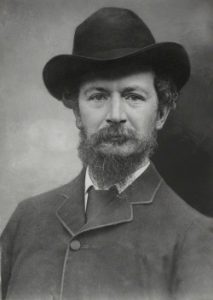
The Complaint of Lisa
(Double Sestina)
Decameron, x. 7
There is no woman living that draws breath
So sad as I, though all things sadden her.
There is not one upon life’s weariest way
Who is weary as I am weary of all but death.
Toward whom I look as looks the sunflower
All day with all his whole soul toward the sun;
While in the sun’s sight I make moan all day,
And all night on my sleepless maiden bed
Weep and call out on death, O Love, and thee,
That thou or he would take me to the dead,
And know not what thing evil I have done
That life should lay such heavy hand on me.
Alas, Love, what is this thou wouldst with me?
What honour shalt thou have to quench my breath,
Or what shall my heart broken profit thee?
O Love, O great god Love, what have I done,
That thou shouldst hunger so after my death?
My heart is harmless as my life’s first day:
Seek out some false fair woman, and plague her
Till her tears even as my tears fill her bed:
I am the least flower in thy flowery way,
But till my time be come that I be dead
Let me live out my flower-time in the sun
Though my leaves shut before the sunflower.
O Love, Love, Love, the kingly sunflower!
Shall he the sun hath looked on look on me,
That live down here in shade, out of the sun,
Here living in the sorrow and shadow of death?
Shall he that feeds his heart full of the day
Care to give mine eyes light, or my lips breath?
Because she loves him shall my lord love her
Who is as a worm in my lord’s kingly way?
I shall not see him or know him alive or dead;
But thou, I know thee, O Love, and pray to thee
That in brief while my brief life-days be done,
And the worm quickly make my marriage-bed.
For underground there is no sleepless bed:
But here since I beheld my sunflower
These eyes have slept not, seeing all night and day
His sunlike eyes, and face fronting the sun.
Wherefore if anywhere be any death,
I would fain find and fold him fast to me,
That I may sleep with the world’s eldest dead,
With her that died seven centuries since, and her
That went last night down the night-wandering way.
For this is sleep indeed, when labour is done,
Without love, without dreams, and without breath,
And without thought, O name unnamed! of thee.
Ah, but, forgetting all things, shall I thee?
Wilt thou not be as now about my bed
There underground as here before the sun?
Shall not thy vision vex me alive and dead,
Thy moving vision without form or breath?
I read long since the bitter tale of her
Who read the tale of Launcelot on a day,
And died, and had no quiet after death,
But was moved ever along a weary way,
Lost with her love in the underworld; ah me,
O my king, O my lordly sunflower,
Would God to me too such a thing were done!
But if such sweet and bitter things be done,
Then, flying from life, I shall not fly from thee.
For in that living world without a sun
Thy vision will lay hold upon me dead,
And meet and mock me, and mar my peace in death.
Yet if being wroth God had such pity on her,
Who was a sinner and foolish in her day,
That even in hell they twain should breathe one breath,
Why should he not in some wise pity me?
So if I sleep not in my soft strait bed
I may look up and see my sunflower
As he the sun, in some divine strange way.
O poor my heart, well knowest thou in what way
This sore sweet evil unto us was done.
For on a holy and a heavy day
I was arisen out of my still small bed
To see the knights tilt, and one said to me
“The king,” and seeing him, somewhat stopped my breath,
And if the girl spake more, I heard not her,
For only I saw what I shall see when dead,
A kingly flower of knights, a sunflower,
That shone against the sunlight like the sun,
And like a fire, O heart, consuming thee,
The fire of love that lights the pyre of death.
Howbeit I shall not die an evil death
Who have loved in such a sad and sinless way,
That this my love, lord, was no shame to thee.
So when mine eyes are shut against the sun,
O my soul’s sun, O the world’s sunflower,
Thou nor no man will quite despise me dead.
And dying I pray with all my low last breath
That thy whole life may be as was that day,
That feast-day that made trothplight death and me,
Giving the world light of thy great deeds done;
And that fair face brightening thy bridal bed,
That God be good as God hath been to her.
That all things goodly and glad remain with her,
All things that make glad life and goodly death;
That as a bee sucks from a sunflower
Honey, when summer draws delighted breath,
Her soul may drink of thy soul in like way,
And love make life a fruitful marriage-bed
Where day may bring forth fruits of joy to day
And night to night till days and nights be dead.
And as she gives light of her love to thee,
Give thou to her the old glory of days long done;
And either give some heat of light to me,
To warm me where I sleep without the sun.
O sunflower made drunken with the sun,
O knight whose lady’s heart draws thine to her,
Great king, glad lover, I have a word to thee.
There is a weed lives out of the sun’s way,
Hid from the heat deep in the meadow’s bed,
That swoons and whitens at the wind’s least breath,
A flower star-shaped, that all a summer day
Will gaze her soul out on the sunflower
For very love till twilight finds her dead.
But the great sunflower heeds not her poor death,
Knows not when all her loving life is done;
And so much knows my lord the king of me.
Aye, all day long he has no eye for me;
With golden eye following the golden sun
From rose-coloured to purple-pillowed bed,
From birthplace to the flame-lit place of death,
From eastern end to western of his way.
So mine eye follows thee, my sunflower,
So the white star-flower turns and yearns to thee,
The sick weak weed, not well alive or dead,
Trod underfoot if any pass by her,
Pale, without colour of summer or summer breath
In the shrunk shuddering petals, that have done
No work but love, and die before the day.
But thou, to-day, to-morrow, and every day,
Be glad and great, O love whose love slays me.
Thy fervent flower made fruitful from the sun
Shall drop its golden seed in the world’s way,
That all men thereof nourished shall praise thee
For grain and flower and fruit of works well done;
Till thy shed seed, O shining sunflower,
Bring forth such growth of the world’s garden-bed
As like the sun shall outlive age and death.
And yet I would thine heart had heed of her
Who loves thee alive; but not till she be dead.
Come, Love, then, quickly, and take her utmost breath.
Song, speak for me who am dumb as are the dead;
From my sad bed of tears I send forth thee,
To fly all day from sun’s birth to sun’s death
Down the sun’s way after the flying sun,
For love of her that gave thee wings and breath,
Ere day be done, to seek the sunflower.
Algernon Charles Swinburne
(1837-1909)
The Complaint of Lisa
(Double Sestina)
Decameron, x. 7
• fleursdumal.nl magazine
More in: # Classic Poetry Archive, Archive S-T, Archive S-T, CLASSIC POETRY, Swinburne, Algernon Charles
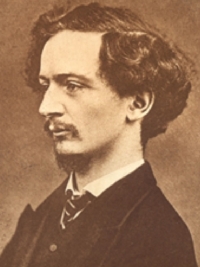
Algernon Charles Swinburne
(1837-1909)
The Garden of Proserpine
Here, where the world is quiet;
Here, where all trouble seems
Dead winds’ and spent waves’ riot
In doubtful dreams of dreams;
I watch the green field growing
For reaping folk and sowing,
For harvest-time and mowing,
A sleepy world of streams.
I am tired of tears and laughter,
And men that laugh and weep,
Of what may came hereafter
For men that sow to reap:
I am weary of days and hours,
Blown buds of barren flowers,
Desires and dreams and powers
And everything but sleep.
Here life has death for neighbour,
And far from eye or ear
Wan waves and wet winds labour,
Weak ships and spirits steer;
They drive adrift, and whither
They wot not who make thither;
But no such winds blow hither,
And no such things grow here.
No growth of moor or coppice,
No heather-flower or vine
But bloomless buds of poppies,
Green grapes of Proserpine.
Pale beds of blowing rushes
Where no leaf blooms or blushes
Save this whereout she crushes
For dead men deadly wine.
Pale, without name or number,
In fruitless fields of corn,
They bow themselves and slumber
All night till light is born;
And like a soul belated,
In hell and heaven unmated,
By cloud and mist abated
Comes out of darkness, morn.
Though one were strong as seven,
He too with death shall dwell,
Nor wake with wings in heaven,
Nor weep for pains in hell;
Though one were fair as roses,
His beauty clouds and closes;
And well though love reposes,
In the end, it is not well.
Pale, beyond porch and portal,
Crowned with calm leaves, she stands
Who gathers all things mortal
With cold immortal hands;
Her languid lips are sweeter
Than love’s who fears to greet her
To men that mix and meet her
From many times and lands.
She waits for each and other,
She waits for all men born;
Forgets the earth her mother,
The life of fruits and corn;
And spring and seed and swallow
Take wing for her and follow
Where summer song rings hollow
And flowers are put to scorn.
There go the loves that wither,
The old loves with wearier wings;
And all dead years draw thither,
And all disastrous things;
Dead dreams of days forsaken,
Blind buds that snows have shaken,
Wild leaves that winds have taken,
Red strays of ruined springs.
We are not sure of sorrow,
And joy was never sure;
Today will die tomorrow;
Time stoops to no man’s lure;
And love, grown faint and fretful,
With lips but half regretful
Sighs, and with eyes forgetful
Weeps that no loves endure.
From too much love of living,
From hope and fear set free,
We thank with brief thanksgiving
Whatever gods may be
That no man lives for ever;
That dead men rise up never;
That even the weariest river
Winds somewhere safe to sea.
Then star nor sun shall waken,
Nor any change of light;
Nor sound of waters shaken,
Nor any sound or sight;
Nor wintry nor vernal,
Nor days, nor things diurnal;
Only the sleep eternal
In an eternal night.
Algernon Charles Swinburne poetry
fleursdumal.nl magazine
More in: Archive S-T, Swinburne, Algernon Charles
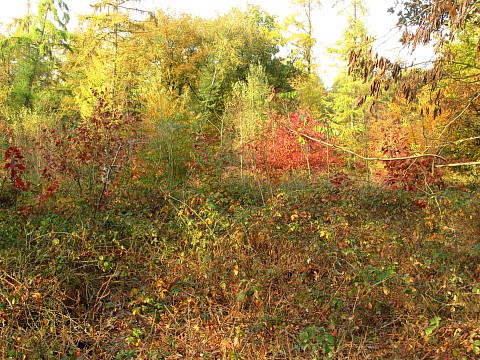
.jpg)
Algernon Charles Swinburne
(1873-1909)
Autumn And Winter
Three months bade wane and wax the wintering moon
Between two dates of death, while men were fain
Yet of the living light that all too soon
Three months bade wane.
Cold autumn, wan with wrath of wind and rain,
Saw pass a soul sweet as the sovereign tune
That death smote silent when he smote again.
First went my friend, in life’s mid light of noon,
Who loved the lord of music: then the strain
Whence earth was kindled like as heaven in June
Three months bade wane.
A herald soul before its master’s flying
Touched by some few moons first the darkling goal
Where shades rose up to greet the shade, espying
A herald soul;
Shades of dead lords of music, who control
Men living by the might of men undying,
With strength of strains that make delight of dole.
The deep dense dust on death’s dim threshold lying
Trembled with sense of kindling sound that stole
Through darkness, and the night gave ear, descrying
A herald soul.
One went before, one after, but so fast
They seem gone hence together, from the shore
Whence we now gaze: yet ere the mightier passed
One went before;
One whose whole heart of love, being set of yore
On that high joy which music lends us, cast
Light round him forth of music’s radiant store.
Then went, while earth on winter glared aghast,
The mortal god he worshipped, through the door
Wherethrough so late, his lover to the last,
One went before.
A star had set an hour before the sun
Sank from the skies wherethrough his heart’s pulse yet
Thrills audibly: but few took heed, or none,
A star had set.
All heaven rings back, sonorous with regret,
The deep dirge of the sunset: how should one
Soft star be missed in all the concourse met?
But, O sweet single heart whose work is done,
Whose songs are silent, how should I forget
That ere the sunset’s fiery goal was won
A star had set?
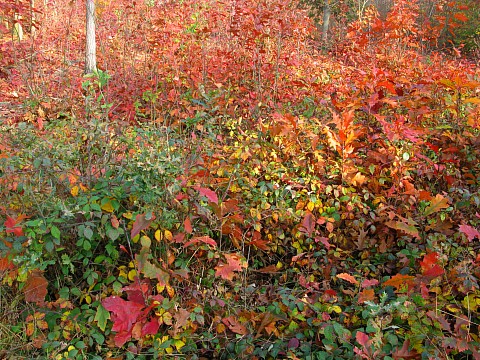
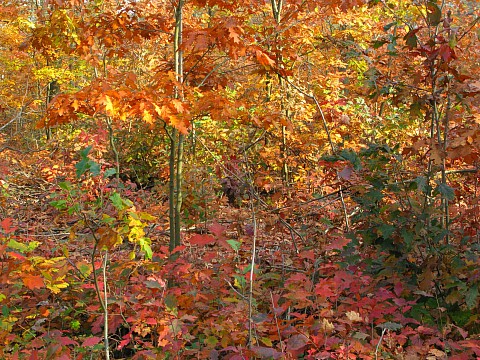
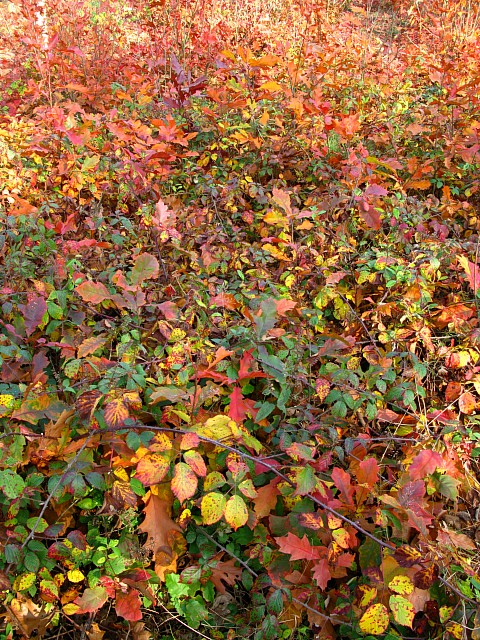
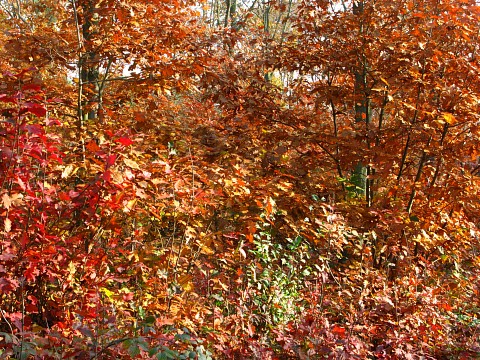

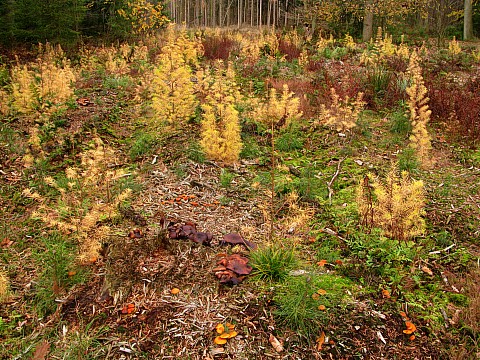
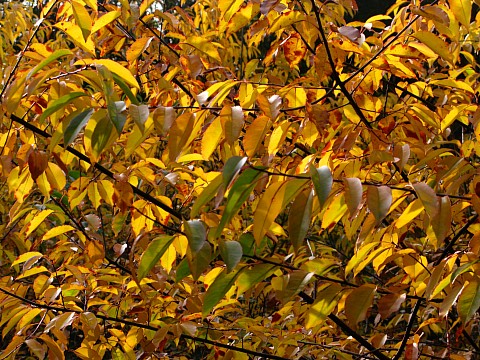
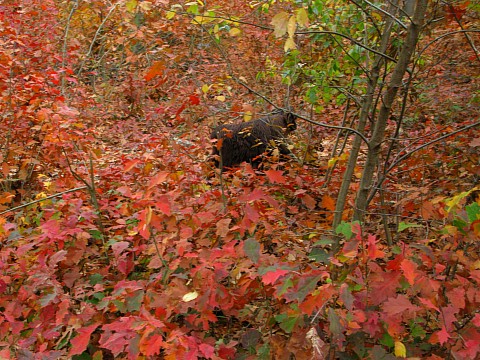
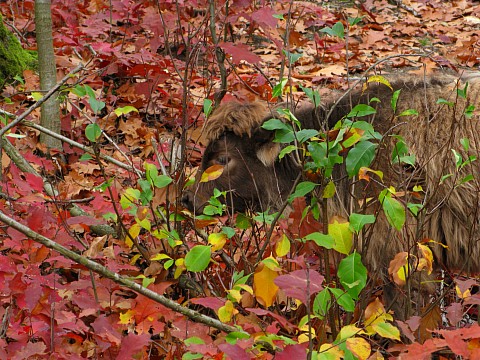
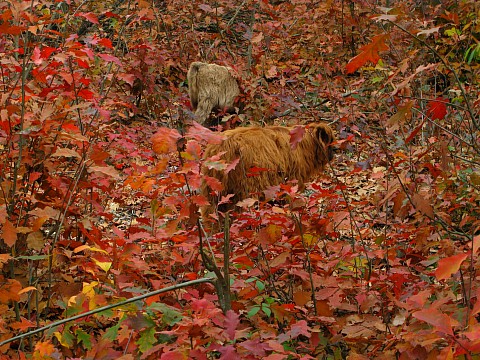
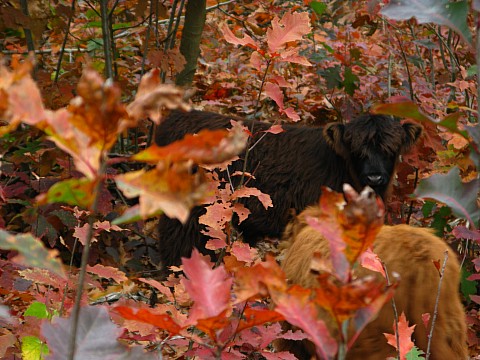
Ton van Kempen photos: Autumn 5
A.C. Swinburne poetry
fleursdumal.nl magazine
More in: 4SEASONS#Autumn, Archive S-T, Swinburne, Algernon Charles, Ton van Kempen Photos
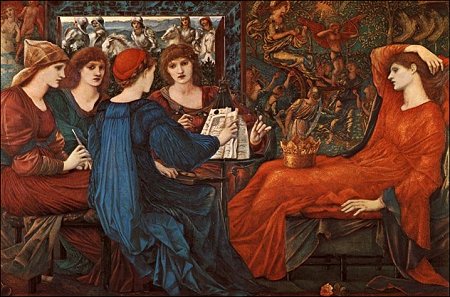
Algernon Charles Swinburne
(1837-1909)
In the water
The sea is awake, and the sound of the song
of the joy of her waking is rolled
From afar to the star that recedes, from anear
to the wastes of the wild wide shore.
Her call is a trumpet compelling us homeward:
if dawn in her east be acold,
From the sea shall we crave not her grace to rekindle
the life that it kindled before,
Her breath to requicken, her bosom to rock us,
her kisses to bless as of yore?
For the wind, with his wings half open, at pause
in the sky, neither fettered nor free,
Leans waveward and flutters the ripple to laughter
and fain would the twain of us be
Where lightly the wave yearns forward from under
the curve of the deep dawn’s dome,
And, full of the morning and fired with the pride
of the glory thereof and the glee,
Strike out from the shore as the heart in us bids
and beseeches, athirst for the foam.
Life holds not an hour that is better to live in:
the past is a tale that is told,
The future a sun-flecked shadow, alive and asleep,
with a blessing in store.
As we give us again to the waters, the rapture
of limbs that the waters enfold
Is less than the rapture of spirit whereby,
though the burden it quits were sore,
Our souls and the bodies they wield at their will
are absorbed in the life they adore–
In the life that endures no burden, and bows not
the forehead, and bends not the knee–
In the life everlasting of earth and of heaven,
in the laws that atone and agree,
In the measureless music of things, in the fervour
of forces that rest or that roam,
That cross and return and reissue, as I
after you and as you after me
Strike out from the shore as the heart in us bids
and beseeches, athirst for the foam.
For, albeit he were less than the least of them, haply
the heart of a man may be bold
To rejoice in the word of the sea as a mother’s
that saith to the son she bore,
Child, was not the life in thee mine, and my spirit
the breath in thy lips from of old?
Have I let not thy weakness exult in my strength,
and thy foolishness learn of my lore?
Have I helped not or healed not thine anguish, or made not
the might of thy gladness more?
And surely his heart should answer, The light
of the love of my life is in thee.
She is fairer than earth, and the sun is not fairer,
the wind is not blither than she:
From my youth hath she shown me the joy of her bays
that I crossed, of her cliffs that I clomb,
Till now that the twain of us here, in desire
of the dawn and in trust of the sea,
Strike out from the shore as the heart in us bids
and beseeches, athirst for the foam.
Friend, earth is a harbour of refuge for winter,
a covert whereunder to flee
When day is the vassal of night, and the strength
of the hosts of her mightier than he;
But here is the presence adored of me, here
my desire is at rest and at home.
There are cliffs to be climbed upon land, there are ways
to be trodden and ridden, but we
Strike out from the shore as the heart in us bids
and beseeches, athirst for the foam.

After a reading
For the seven times seventh time love would renew
the delight without end or alloy
That it takes in the praise as it takes in the presence
of eyes that fulfil it with joy;
But how shall it praise them and rest unrebuked
by the presence and pride of the boy?
Praise meet for a child is unmeet for an elder
whose winters and springs are nine
What song may have strength in its wings to expand them,
or light in its eyes to shine,
That shall seem not as weakness and darkness if matched
with the theme I would fain make mine?
The round little flower of a face that exults
in the sunshine of shadowless days
Defies the delight it enkindles to sing of it
aught not unfit for the praise
Of the sweetest of all things that eyes may rejoice in
and tremble with love as they gaze.
Such tricks and such meanings abound on the lips
and the brows that are brighter than light,
The demure little chin, the sedate little nose,
and the forehead of sun-stained white,
That love overflows into laughter and laughter
subsides into love at the sight.
Each limb and each feature has action in tune
with the meaning that smiles as it speaks
From the fervour of eyes and the fluttering of hands
in a foretaste of fancies and freaks,
When the thought of them deepens the dimples that laugh
in the corners and curves of his cheeks.
As a bird when the music within her is yet
too intense to be spoken in song,
That pauses a little for pleasure to feel
how the notes from withinwards throng,
So pauses the laugh at his lips for a little,
and waxes within more strong.
As the music elate and triumphal that bids
all things of the dawn bear part
With the tune that prevails when her passion has risen
into rapture of passionate art,
So lightens the laughter made perfect that leaps
from its nest in the heaven of his heart.
Deep, grave and sedate is the gaze of expectant
intensity bent for awhile
And absorbed on its aim as the tale that enthralls him
uncovers the weft of its wile,
Till the goal of attention is touched, and expectancy
kisses delight in a smile.
And it seems to us here that in Paradise hardly
the spirit of Lamb or of Blake
May hear or behold aught sweeter than lightens
and rings when his bright thoughts break
In laughter that well might lure them to look,
and to smile as of old for his sake.
O singers that best loved children, and best
for their sakes are beloved of us here,
In the world of your life everlasting, where love
has no thorn and desire has no fear,
All else may be sweeter than aught is on earth,
nought dearer than these are dear.
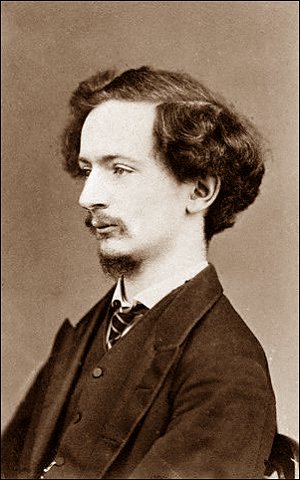
Love and scorn
I
Love, loyallest and lordliest born of things,
Immortal that shouldst be, though all else end,
In plighted hearts of fearless friend with friend,
Whose hand may curb or clip thy plume-plucked wings?
Not grief’s nor time’s: though these be lords and kings
Crowned, and their yoke bid vassal passions bend,
They may not pierce the spirit of sense, or blend
Quick poison with the soul’s live watersprings.
The true clear heart whose core is manful trust
Fears not that very death may turn to dust
Love lit therein as toward a brother born,
If one touch make not all its fine gold rust,
If one breath blight not all its glad ripe corn,
And all its fire be turned to fire of scorn.
II
Scorn only, scorn begot of bitter proof
By keen experience of a trustless heart,
Bears burning in her new-born hand the dart
Wherewith love dies heart-stricken, and the roof
Falls of his palace, and the storied woof
Long woven of many a year with life’s whole art
Is rent like any rotten weed apart,
And hardly with reluctant eyes aloof
Cold memory guards one relic scarce exempt
Yet from the fierce corrosion of contempt,
And hardly saved by pity. Woe are we
That once we loved, and love not; but we know
The ghost of love, surviving yet in show,
Where scorn has passed, is vain as grief must be.
III
O sacred, just, inevitable scorn,
Strong child of righteous judgment, whom with grief
The rent heart bears, and wins not yet relief,
Seeing of its pain so dire a portent born,
Must thou not spare one sheaf of all the corn,
One doit of all the treasure? not one sheaf,
Not one poor doit of all? not one dead leaf
Of all that fell and left behind a thorn?
Is man so strong that one should scorn another?
Is any as God, not made of mortal mother,
That love should turn in him to gall and flame?
Nay: but the true is not the false heart’s brother:
Love cannot love disloyalty: the name
That else it wears is love no more, but shame.
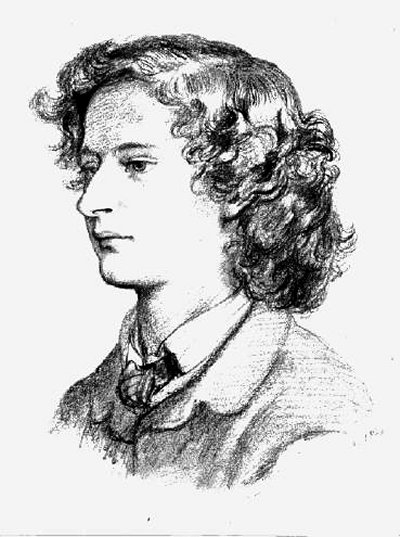
A solitude
Sea beyond sea, sand after sweep of sand,
Here ivory smooth, here cloven and ridged with flow
Of channelled waters soft as rain or snow,
Stretch their lone length at ease beneath the bland
Grey gleam of skies whose smile on wave and strand
Shines weary like a man’s who smiles to know
That now no dream can mock his faith with show,
Nor cloud for him seem living sea or land.
Is there an end at all of all this waste,
These crumbling cliffs defeatured and defaced,
These ruinous heights of sea-sapped walls that slide
Seaward with all their banks of bleak blown flowers
Glad yet of life, ere yet their hope subside
Beneath the coil of dull dense waves and hours?
First and last
Upon the borderlands of being,
Where life draws hardly breath
Between the lights and shadows fleeing
Fast as a word one saith,
Two flowers rejoice our eyesight, seeing
The dawns of birth and death.
Behind the babe his dawn is lying
Half risen with notes of mirth
From all the winds about it flying
Through new-born heaven and earth:
Before bright age his day for dying
Dawns equal-eyed with birth.
Equal the dews of even and dawn,
Equal the sun’s eye seen
A hand’s breadth risen and half withdrawn:
But no bright hour between
Brings aught so bright by stream or lawn
To noonday growths of green.
Which flower of life may smell the sweeter
To love’s insensual sense,
Which fragrance move with offering meeter
His soothed omnipotence,
Being chosen as fairer or as fleeter,
Borne hither or borne hence,
Love’s foiled omniscience knows not: this
Were more than all he knows
With all his lore of bale and bliss,
The choice of rose and rose,
One red as lips that touch with his,
One white as moonlit snows.
No hope is half so sweet and good,
No dream of saint or sage
So fair as these are: no dark mood
But these might best assuage;
The sweet red rose of babyhood,
The white sweet rose of age.
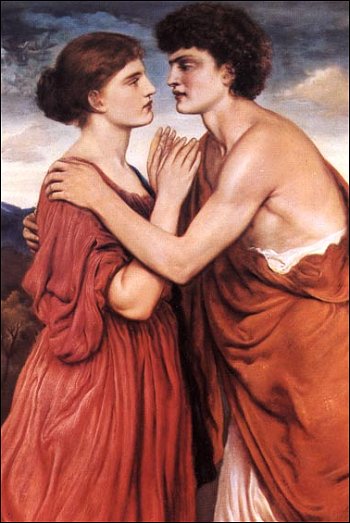
Algernon Charles Swinburne: Five Poems
kempis poetry magazine
More in: PRE-RAPHAELITES, Swinburne, Algernon Charles
.jpg)
Algernon Charles Swinburne
(1837-1909)
S u n r i s e
If the wind and the sunlight of April and August had mingled the
past and hereafter
In a single adorable season whose life were a rapture of love and
of laughter,
And the blithest of singers were back with a song; if again from
his tomb as from prison,
If again from the night or the twilight of ages Aristophanes had
arisen,
With the gold-feathered wings of a bird that were also a god upon
earth at his shoulders,
And the gold-flowing laugh of the manhood of old at his lips, for a
joy to beholders,
He alone unrebuked of presumption were able to set to some adequate
measure
The delight of our eyes in the dawn that restores them the sun of
their sense and the pleasure.
For the days of the darkness of spirit are over for all of us here,
and the season
When desire was a longing, and absence a thorn, and rejoicing a
word without reason.
For the roof overhead of the pines is astir with delight as of
jubilant voices,
And the floor underfoot of the bracken and heather alive as a heart
that rejoices.
For the house that was childless awhile, and the light of it
darkened, the pulse of it dwindled,
Rings radiant again with a child’s bright feet, with the light of
his face is rekindled.
And the ways of the meadows that knew him, the sweep of the down
that the sky’s belt closes,
Grow gladder at heart than the soft wind made them whose feet were
but fragrant with roses,
Though the fall of the year be upon us, who trusted in June and by
June were defrauded,
And the summer that brought us not back the desire of our eyes be
gone hence unapplauded.
For July came joyless among us, and August went out from us arid
and sterile,
And the hope of our hearts, as it seemed, was no more than a flower
that the seasons imperil,
And the joy of our hearts, as it seemed, than a thought which
regret had not heart to remember,
Till four dark months overpast were atoned for, and summer began in
September.
Hark, April again as a bird in the house with a child’s voice
hither and thither:
See, May in the garden again with a child’s face cheering the woods
ere they wither.
June laughs in the light of his eyes, and July on the sunbright
cheeks of him slumbers,
And August glows in a smile more sweet than the cadence of
gold-mouthed numbers.
In the morning the sight of him brightens the sun, and the noon
with delight in him flushes,
And the silence of nightfall is music about him as soft as the
sleep that it hushes.
We awake with a sense of a sunrise that is not a gift of the
sundawn’s giving,
And a voice that salutes us is sweeter than all sounds else in the
world of the living,
And a presence that warms us is brighter than all in the world of
our visions beholden,
Though the dreams of our sleep were as those that the light of a
world without grief makes golden.
For the best that the best of us ever devised as a likeness of
heaven and its glory,
What was it of old, or what is it and will be for ever, in song or
in story,
Or in shape or in colour of carven or painted resemblance, adored
of all ages,
But a vision recorded of children alive in the pictures of old or
the pages?
Where children are not, heaven is not, and heaven if they come not
again shall be never:
But the face and the voice of a child are assurance of heaven and
its promise for ever.
kemp=mag poetry magazine
More in: Archive S-T, Swinburne, Algernon Charles
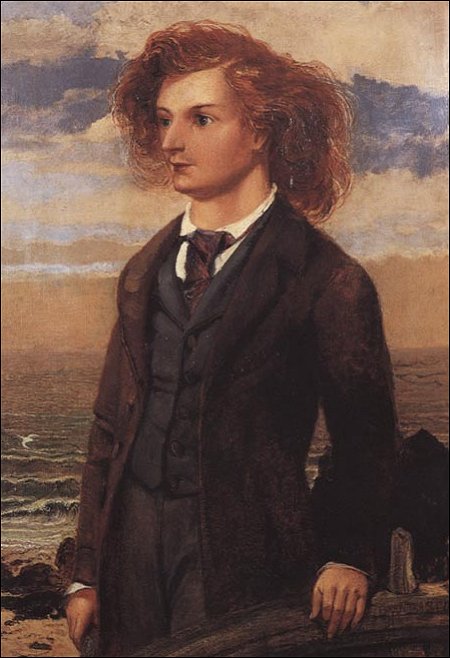
Algernon Charles Swinburne
(1837-1909)
A NEW-YEAR ODE
To Victor Hugo
I
Twice twelve times have the springs of years refilled
Their fountains from the river-head of time
Since by the green sea’s marge, ere autumn chilled
Waters and woods with sense of changing clime,
A great light rose upon my soul, and thrilled
My spirit of sense with sense of spheres in chime,
Sound as of song wherewith a God would build
Towers that no force of conquering war might climb.
Wind shook the glimmering sea
Even as my soul in me
Was stirred with breath of mastery more sublime,
Uplift and borne along
More thunderous tides of song,
Where wave rang back to wave more rapturous rhyme
And world on world flashed lordlier light
Than ever lit the wandering ways of ships by night.
II
The spirit of God, whose breath of life is song,
Moved, though his word was human, on the face
Of those deep waters of the soul, too long
Dumb, dark, and cold, that waited for the grace
Wherewith day kindles heaven: and as some throng
Of quiring wings fills full some lone chill place
With sudden rush of life and joy, more strong
Than death or sorrow or all night’s darkling race,
So was my heart, that heard
All heaven in each deep word,
Filled full with light of thought, and waxed apace
Itself more wide and deep,
To take that gift and keep
And cherish while my days fulfilled their space;
A record wide as earth and sea,
The Legend writ of Ages past and yet to be.
III
As high the chant of Paradise and Hell
Rose, when the soul of Milton gave it wings;
As wide the sweep of Shakespeare’s empire fell,
When life had bared for him her secret springs;
But not his various soul might range and dwell
Amid the mysteries of the founts of things;
Nor Milton’s range of rule so far might swell
Across the kingdoms of forgotten kings.
Men, centuries, nations, time,
Life, death, love, trust, and crime,
Rang record through the change of smitten strings
That felt an exile’s hand
Sound hope for every land
More loud than storm’s cloud-sundering trumpet rings,
And bid strong death for judgment rise,
And life bow down for judgment of his awless eyes.
IV
And death, soul-stricken in his strength, resigned
The keeping of the sepulchres to song;
And life was humbled, and his height of mind
Brought lower than lies a grave-stone fallen along;
And like a ghost and like a God mankind
Rose clad with light and darkness; weak and strong,
Clean and unclean, with eyes afire and blind,
Wounded and whole, fast bound with cord and thong,
Free; fair and foul, sin-stained,
And sinless; crowned and chained;
Fleet-limbed, and halting all his lifetime long;
Glad of deep shame, and sad
For shame’s sake; wise, and mad;
Girt round with love and hate of right and wrong;
Armed and disarmed for sleep and strife;
Proud, and sore fear made havoc of his pride of life.
V
Shadows and shapes of fable and storied sooth
Rose glorious as with gleam of gold unpriced;
Eve, clothed with heavenly nakedness and youth
That matched the morning’s; Cain, self-sacrificed
On crime’s first altar: legends wise as truth,
And truth in legends deep embalmed and spiced;
The stars that saw the starlike eyes of Ruth,
The grave that heard the clarion call of Christ.
And higher than sorrow and mirth
The heavenly song of earth
Sprang, in such notes as might have well sufficed
To still the storms of time
And sin’s contentious clime
With peace renewed of life reparadised:
Earth, scarred not yet with temporal scars;
Goddess of gods, our mother, chosen among the stars.
VI
Earth fair as heaven, ere change and time set odds
Between them, light and darkness know not when,
And fear, grown strong through panic periods,
Crouched, a crowned worm, in faith’s Lernean fen,
And love lay bound, and hope was scourged with rods,
And death cried out from desert and from den,
Seeing all the heaven above him dark with gods
And all the world about him marred of men.
Cities that nought might purge
Save the sea’s whelming surge
From all the pent pollutions in their pen
Deep death drank down, and wrought,
With wreck of all things, nought,
That none might live of all their names again,
Nor aught of all whose life is breath
Serve any God whose likeness was not like to death.
VII
Till by the lips and eyes of one live nation
The blind mute world found grace to see and speak,
And light watched rise a more divine creation
At that more godlike utterance of the Greek,
Let there be freedom. Kings whose orient station
Made pale the morn, and all her presage bleak,
Girt each with strengths of all his generation,
Dim tribes of shamefaced soul and sun-swart cheek,
Twice, urged with one desire,
Son following hard on sire,
With all the wrath of all a world to wreak,
And all the rage of night
Afire against the light
Whose weakness makes her strong-winged empire weak,
Stood up to unsay that saying, and fell
Too far for song, though song were thousand-tongued, to tell.
VIII
From those deep echoes of the loud Ægean
That rolled response whereat false fear was chid
By songs of joy sublime and Sophoclean,
Fresh notes reverberate westward rose to bid
All wearier times take comfort from the pæan
That tells the night what deeds the sunrise did,
Even till the lawns and torrents Pyrenean
Ring answer from the records of the Cid.
But never force of fountains
From sunniest hearts of mountains
Wherein the soul of hidden June was hid
Poured forth so pure and strong
Springs of reiterate song,
Loud as the streams his fame was reared amid,
More sweet than flowers they feed, and fair
With grace of lordlier sunshine and more lambent air.
IX
A star more prosperous than the storm-clothed east’s
Clothed all the warm south-west with light like spring’s,
When hands of strong men spread the wolves their feasts
And from snake-spirited princes plucked the stings;
Ere earth, grown all one den of hurtling beasts,
Had for her sunshine and her watersprings
The fire of hell that warmed the hearts of priests,
The wells of blood that slaked the lips of kings.
The shadow of night made stone
Stood populous and alone,
Dense with its dead and loathed of living things
That draw not life from death,
And as with hell’s own breath
And clangour of immitigable wings
Vexed the fair face of Paris, made
Foul in its murderous imminence of sound and shade.
X
And all these things were parcels of the vision
That moved a cloud before his eyes, or stood
A tower half shattered by the strong collision
Of spirit and spirit, of evil gods with good;
A ruinous wall rent through with grim division,
Where time had marked his every monstrous mood
Of scorn and strength and pride and self-derision:
The Tower of Things, that felt upon it brood
Night, and about it cast
The storm of all the past
Now mute and forceless as a fire subdued:
Yet through the rifted years
And centuries veiled with tears
And ages as with very death imbrued
Freedom, whence hope and faith grow strong,
Smiles, and firm love sustains the indissoluble song.
XI
Above the cloudy coil of days deceased,
Its might of flight, with mists and storms beset,
Burns heavenward, as with heart and hope increased,
For all the change of tempests, all the fret
Of frost or fire, keen fraud or force released,
Wherewith the world once wasted knows not yet
If evil or good lit all the darkling east
From the ardent moon of sovereign Mahomet.
Sublime in work and will
The song sublimer still
Salutes him, ere the splendour shrink and set;
Then with imperious eye
And wing that sounds the sky
Soars and sees risen as ghosts in concourse met
The old world’s seven elder wonders, firm
As dust and fixed as shadows, weaker than the worm.
XII
High witness borne of knights high-souled and hoary
Before death’s face and empire’s rings and glows
Even from the dust their life poured forth left gory,
As the eagle’s cry rings after from the snows
Supreme rebuke of shame clothed round with glory
And hosts whose track the false crowned eagle shows;
More loud than sounds through stormiest song and story
The laugh of slayers whose names the sea-wind knows;
More loud than peals on land
In many a red wet hand
The clash of gold and cymbals as they close;
Loud as the blast that meets
The might of marshalled fleets
And sheds it into shipwreck, like a rose
Blown from a child’s light grasp in sign
That earth’s high lords are lords not over breeze and brine.
XIII
Above the dust and mire of man’s dejection
The wide-winged spirit of song resurgent sees
His wingless and long-labouring resurrection
Up the arduous heaven, by sore and strange degrees
Mount, and with splendour of the soul’s reflection
Strike heaven’s dark sovereign down upon his knees,
Pale in the light of orient insurrection,
And dumb before the almightier lord’s decrees
Who bade him be of yore,
Who bids him be no more:
And all earth’s heart is quickened as the sea’s,
Even as when sunrise burns
The very sea’s heart yearns
That heard not on the midnight-walking breeze
The wail that woke with evensong
From hearts of poor folk watching all the darkness long.
XIV
Dawn and the beams of sunbright song illume
Love, with strange children at her piteous breast,
By grace of weakness from the grave-mouthed gloom
Plucked, and by mercy lulled to living rest,
Soft as the nursling’s nigh the grandsire’s tomb
That fell on sleep, a bird of rifled nest;
Soft as the lips whose smile unsaid the doom
That gave their sire to violent death’s arrest.
Even for such love’s sake strong,
Wrath fires the inveterate song
That bids hell gape for one whose bland mouth blest
All slayers and liars that sighed
Prayer as they slew and lied
Till blood had clothed his priesthood as a vest,
And hears, though darkness yet be dumb,
The silence of the trumpet of the wrath to come.
XV
Nor lacked these lights of constellated age
A star among them fed with life more dire,
Lit with his bloodied fame, whose withering rage
Made earth for heaven’s sake one funereal pyre
And life in faith’s name one appointed stage
For death to purge the souls of men with fire.
Heaven, earth, and hell on one thrice tragic page
Mixed all their light and darkness: one man’s lyre
Gave all their echoes voice;
Bade rose-cheeked love rejoice,
And cold-lipped craft with ravenous fear conspire,
And fire-eyed faith smite hope
Dead, seeing enthroned as Pope
And crowned of heaven on earth at hell’s desire
Sin, called by death’s incestuous name
Borgia: the world that heard it flushed and quailed with shame.
XVI
Another year, and hope triumphant heard
The consummating sound of song that spake
Conclusion to the multitudinous word
Whose expectation held her spirit awake
Till full delight for twice twelve years deferred
Bade all souls entering eat and drink, and take
A third time comfort given them, that the third
Might heap the measure up of twain, and make
The sinking year sublime
Among all sons of time
And fan in all men’s memories for his sake.
Each thought of ours became
Fire, kindling from his flame,
And music widening in his wide song’s wake.
Yea, and the world bore witness here
How great a light was risen upon this darkening year.
XVII
It was the dawn of winter: sword in sheath,
Change, veiled and mild, came down the gradual air
With cold slow smiles that hid the doom beneath.
Five days to die in yet were autumn’s, ere
The last leaf withered from his flowerless wreath.
South, east, and north, our skies were all blown bare,
But westward over glimmering holt and heath
Cloud, wind, and light had made a heaven more fair
Than ever dream or truth
Showed earth in time’s keen youth
When men with angels communed unaware.
Above the sun’s head, now
Veiled even to the ardent brow,
Rose two sheer wings of sundering cloud, that were
As a bird’s poised for vehement flight,
Full-fledged with plumes of tawny fire and hoar grey light.
XVIII
As midnight black, as twilight brown, they spread,
But feathered thick with flame that streaked and lined
Their living darkness, ominous else of dread,
From south to northmost verge of heaven inclined
Most like some giant angel’s, whose bent head
Bowed earthward, as with message for mankind
Of doom or benediction to be shed
From passage of his presence. Far behind,
Even while they seemed to close,
Stoop, and take flight, arose
Above them, higher than heavenliest thought may find
In light or night supreme
Of vision or of dream,
Immeasurable of men’s eyes or mounting mind,
Heaven, manifest in manifold
Light of pure pallid amber, cheered with fire of gold.
XIX
And where the fine gold faded all the sky
Shone green as the outer sea when April glows,
Inlaid with flakes and feathers fledged to fly
Of cloud suspense in rapture and repose,
With large live petals, broad as love bids lie
Full open when the sun salutes the rose,
And small rent sprays wherewith the heavens most high
Were strewn as autumn strews the garden-close
With ruinous roseleaves whirled
About their wan chill world,
Through wind-worn bowers that now no music knows,
Spoil of the dim dusk year
Whose utter night is near,
And near the flower of dawn beyond it blows;
Till east and west were fire and light,
As though the dawn to come had flushed the coming night.
XX
The highways paced of men that toil or play,
The byways known of none but lonely feet,
Were paven of purple woven of night and day
With hands that met as hands of friends might meet–
As though night’s were not lifted up to slay
And day’s had waxed not weaker. Peace more sweet
Than music, light more soft than shadow, lay
On downs and moorlands wan with day’s defeat,
That watched afar above
Life’s very rose of love
Let all its lustrous leaves fall, fade, and fleet,
And fill all heaven and earth
Full as with fires of birth
Whence time should feed his years with light and heat:
Nay, not life’s, but a flower more strong
Than life or time or death, love’s very rose of song.
XXI
Song visible, whence all men’s eyes were lit
With love and loving wonder: song that glowed
Through cloud and change on souls that knew not it
And hearts that wist not whence their comfort flowed,
Whence fear was lightened of her fever-fit,
Whence anguish of her life-compelling load.
Yea, no man’s head whereon the fire alit,
Of all that passed along that sunset road
Westward, no brow so drear,
No eye so dull of cheer,
No face so mean whereon that light abode,
But as with alien pride
Strange godhead glorified
Each feature flushed from heaven with fire that showed
The likeness of its own life wrought
By strong transfiguration as of living thought.
XXII
Nor only clouds of the everlasting sky,
Nor only men that paced that sunward way
To the utter bourne of evening, passed not by
Unblest or unillumined: none might say,
Of all things visible in the wide world’s eye,
That all too low for all that grace it lay:
The lowliest lakelets of the moorland nigh,
The narrowest pools where shallowest wavelets play,
Were filled from heaven above
With light like fire of love,
With flames and colours like a dawn in May,
As hearts that lowlier live
With light of thoughts that give
Light from the depth of souls more deep than they
Through song’s or story’s kindling scroll,
The splendour of the shadow that reveals the soul.
XXIII
For, when such light is in the world, we share,
All of us, all the rays thereof that shine:
Its presence is alive in the unseen air,
Its fire within our veins as quickening wine;
A spirit is shed on all men everywhere,
Known or not known of all men for divine.
Yea, as the sun makes heaven, that light makes fair
All souls of ours, all lesser souls than thine,
Priest, prophet, seer and sage,
Lord of a subject age
That bears thy seal upon it for a sign;
Whose name shall be thy name,
Whose light thy light of fame,
The light of love that makes thy soul a shrine;
Whose record through all years to be
Shall bear this witness written–that its womb bare thee.
XXIV
O mystery, whence to one man’s hand was given
Power upon all things of the spirit, and might
Whereby the veil of all the years was riven
And naked stood the secret soul of night!
O marvel, hailed of eyes whence cloud is driven,
That shows at last wrong reconciled with right
By death divine of evil and sin forgiven!
O light of song, whose fire is perfect light!
No speech, no voice, no thought,
No love, avails us aught
For service of thanksgiving in his sight
Who hath given us all for ever
Such gifts that man gave never
So many and great since first Time’s wings took flight.
Man may not praise a spirit above
Man’s: life and death shall praise him: we can only love.
XXV
Life, everlasting while the worlds endure,
Death, self-abased before a power more high,
Shall bear one witness, and their word stand sure,
That not till time be dead shall this man die
Love, like a bird, comes loyal to his lure;
Fame flies before him, wingless else to fly.
A child’s heart toward his kind is not more pure,
An eagle’s toward the sun no lordlier eye.
Awe sweet as love and proud
As fame, though hushed and bowed,
Yearns toward him silent as his face goes by:
All crowns before his crown
Triumphantly bow down,
For pride that one more great than all draws nigh:
All souls applaud, all hearts acclaim,
One heart benign, one soul supreme, one conquering name.
.jpg)
Algernon Charles Swinburne: A New-Year Ode to Victor Hugo
fleursdumal.nl magazine – magazine for art & literature
More in: Swinburne, Algernon Charles, Victor Hugo
Thank you for reading Fleurs du Mal - magazine for art & literature